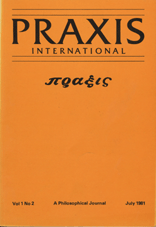Pologne: La Fin de la Société communiste
Poland: The End of the Communist Society
Author(s): Alain TouraineSubject(s): History
Published by: Blackwell Publishing Ltd
Summary/Abstract: The military take-over in Poland means the defeat of communist society and its central principle — the control of social life by the political ideology of a party which considers itself the expression of workers. The conflict between the Party and society was apparent during the Stalinist era and the repression of popular and intellectual movements in the last two decades, but the Party was not simply a ruling élite. It claimed to represent the needs of society and the workers' interests. Many insisted on the common hopes of the Party and the mass of Solidarity members. But by the middle of 1981 the gap widens. As Solidarity leaders leave the Party and workers return their Party cards, Solidarity appears as a huge national and social movement, the expression of the Polish population outside the Party. By resorting to military force the Party has lost the foundations of its totalitarian power — it cannot claim to speak for society and history. The Polish situation is contrasted with that of Czechoslovakia and Kadar's Hungary. Increasingly in Poland, as in Rumania, political power plays a repressive role, faced with the growing hostility of the main workers' groups. For a long time popular movements fought an ancien régime on behalf of progress, but Solidarity has clearly shown the new thrust of a popular movement opposed to a productivist modernizing regime, in the name of human rights and freedoms. The military coup signals the defeat of a totalitarian party and a direct confrontation between power and society.
Journal: PRAXIS International
- Issue Year: 2/1982
- Issue No: 2
- Page Range: 141-147
- Page Count: 7
- Language: French

